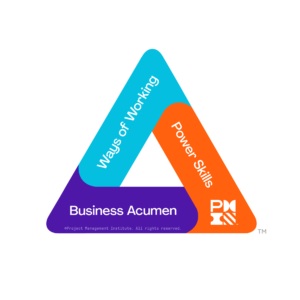
PMI has updated the Talent Triangle to emphasize the skills needed for project managers today. Instead of the previous ‘Technical Skills’, ‘Leadership Skills’, and ‘Strategy and Business Skills’, they are now ‘Ways of Working’ (replaces Technical Skills”), Business Acumen (replace Strategic and Business Management Skills), and ‘Power Skills’ (replacing Leadership Skills). The key change is PMI’s focus of different ways of working, which relates to their Disciplined Agile Toolkit – that harnesses hundreds of Agile practices to guide you to the best way of working for your team or organization. Here’s a summary of the announcement of this change from PMI:
To help project professionals navigate this changing world of work and embrace smarter ways of working, we’ve updated the sides of the PMI Talent Triangle® to now focus on new ways of working, business acumen, and power skills.
- Regardless of industry, PMI believes professionals at every level of an organization need to make good decisions, have influence with different stakeholder groups, and be empowered to choose the best way of working for any given situation.
- To prepare for a future that is coming faster than ever, we see the power of melding the core insights of project management with three skill categories: a diverse understanding of the new ways of working, business acumen, and power skills.
- Ways of Working (previously the “Technical Project Management” side): Whether it’s predictive, agile, design thinking, or new practices still to be developed, it’s clear that there is more than one way that work gets done today. That’s why we encourage professionals to master as many ways of working as they can — so they can apply the right technique at the right time, delivering winning results.
- Business Acumen (previously the “Strategic and Business Management” side): Professionals with business acumen understand the macro and micro influences in their organization and industry and have the function- or domain-specific knowledge – to make good decisions. Professionals at all levels need to be able to cultivate effective decision-making and understand how their projects align with the big picture of broader organizational strategy and global trends.
- Power Skills (previously the “Leadership” side): These interpersonal skills include collaborative leadership, communication, an innovative mindset, for-purpose orientation, and empathy. Ensuring teams have these skills allows them to maintain influence with a variety of stakeholders – a critical component for making change.
